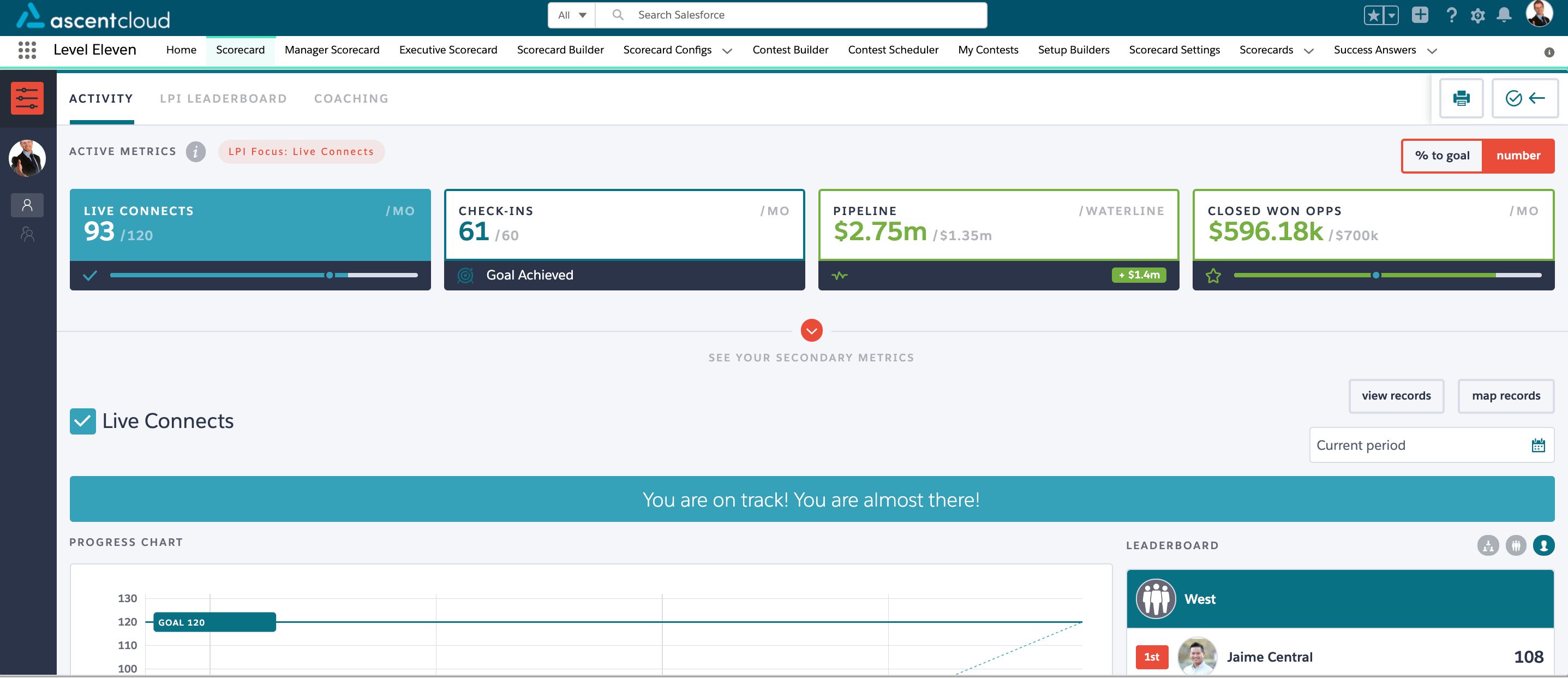2020 has been a challenging year for all organizations. To some, this year has felt like a constant state of catch-up. The uneasiness of this year might have caused you and your team to fall off track, and you might be unsure about what to do next. We’ve provided a quick rundown on how using LevelEleven, along with the Salesforce data you already have, will help to be proactive with your planning and prepare your team for an outstanding year.
The power LevelEleven provides is the ability to pair metrics with performance in order to track progress. There’s no need for scanning emails or notebooks to find coaching notes and past conversations. With LevelEleven, the information you need (as a rep or a manager) is all stored in one place. Reflecting on what was achieved this year will give you a better idea of what to expect in 2021.
Executive Scorecard
As a high-level manager, you’ll want to prepare yourself for end-of-year conversations to set expectations for next year’s goals. Executive Scorecard will help you streamline processes, keeping your team’s metrics in one place. Although your individual teams have different focuses, your organization’s success is most likely a common goal. View these multiple different teams’ metrics in one place, and look for trends in the data before drilling down into individual team member’s scorecards. We’ll discuss individual scorecards in more detail later on.
Coaching Notes
With LevelEleven, your coaching notes, along with activity screenshots, are all saved in one consolidated place, giving managers the opportunity to review past conversations and performance to better understand trends and capabilities.
You’ll want to utilize these notes in order to set new goals and form your 2021 strategy starting with which goals were consistently hit/missed. Finding common trends amongst your team gives a better idea of what your team goals should be for 2021. If your team is consistently hitting one of their goals, you might want to challenge them by tracking different metrics or setting additional goals.
The key to reevaluating this year is looking at the Salesforce data you’ve been keeping track of all this time in order to avoid miscommunication or arbitrary coaching. The goal is to have meaningful, data-driven conversations- referencing numbers, behaviors, and coaching conversations.
That being said, you probably won’t want to set these goals alone. Consider including your team in these conversations.
Performance Scorecards
As you begin to plan for 2021, set time aside with your team members to review their individual Performance Scorecards in order to set goals for the following year. Consider what they accomplished this year in order to set realistic goals. Find a focus for each member to work on, such as increasing call volume or earning a higher spot on the Leaderboard. Each member of your team has strengths and weaknesses, personalize their metrics and goals for the year by tracking what matters to them.

Conversion Insights
Use our newest feature, Conversion Insights, in order to quickly visualize goals and understand what it will take to achieve those goals in the coming year. The best way to predict the future is to look at the past. Unless there has been a huge change, chances are next year’s goals will be conservative compared to previous years. However, this doesn’t mean big things are impossible!
Don’t set arbitrary goals for your team without using your Salesforce data to back it up. Conversion Insights provide you the ability to drill down into your tracked metrics in order to see realistic targets. Keep in mind that your team might need extra guidance when navigating next year’s goals, so we encourage you to come prepared with a plan of how to reach these new goals.
Contests
Contests are great when they’re done the right way. They’re not difficult by any means, but they do take some planning. No one wants to participate in a contest that’s unmotivating or unclear, so prepare your contests for the year as part of your 2021 planning.
For example: If you know you have a slower start at the beginning of the year due, plan a contest right away to set the tone for a high-performing team.
Ultimately, planning for next year might take more work than you’re used to, but having data-driven conversations is more helpful for your team than throwing quotas, and hoping they’ll stick. After a year of uncertainty, you’ll want to ensure to set some clear expectations with your team. Do this by using the metrics you’ve been tracking (along with some help from LevelEleven) and motivating what matters.



